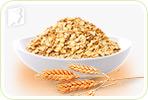Many women prefer to explore an organic approach when it comes to personal health, particularly when they are going through menopause. There are a number of herbs and supplements that can be suggested for treating the many side effects of menopause, including night sweats. Some herbs can be highly valuable for their cooling effects in general, and others might be beneficial due to their interaction with the reproductive hormones that fluctuate during menopause. Find out four of the best herbs for night sweats.
Sage
Advocates of natural medicine have long endorsed the use of sage for assuaging difficult menopausal symptoms, especially those pertaining to temperature: hot flashes and night sweats. Recent scientific studies have proven its abilities to cool the body, and therefore minimize night sweats. Popular preparations include capsules and tea, and these are considered safe to consume in moderation. Over-use of this herb can cause damage to the nervous system and the liver.
Mint
During menopause, many women have benefits from the use of mint in various forms. It is widely known that mint leaves can act as a coolant, due to the presence of the compound menthol. It is popularly administered in the form of a vapor rub, or tea to enable the full effects of the chemicals to be experienced. Women who suffer from night sweats will find that this is one of the most effective herbs. However, if over-consumed, mint can cause gastronomic discomfort and diarrhea.
Fennel
Scientific research has revealed that fennel can be effective in easing menopausal symptoms, because it contains compounds known as phytoestrogens which can be used to replace dwindling levels of estrogen. This can counter the effects of low estrogen, such as night sweats and other factors associated with menopause. Fennel is a versatile vegetable that can be consumed as part of a meal, tea, or with other herbal supplements.
Fuchsia
One species of the fuchsia flower - fuchsia magellanica - has been scientifically investigated for its potential health benefits, and it has been discovered that substances in the leaf extract can be used to reduce body temperature. Some women find that, as little as one cup of fuchsia leaf tea each day, is adequate for staving off high bodily temperatures, and as a consequence - less frequent night sweats.
Knowledge of what natural options there are for night sweats can be beneficial to those who prefer to consider home remedies before other treatments such as prescribed medication. Herbalists can recommend many different supplements that can be useful for relieving or lessening night sweat episodes, but the above four have been found particularly successful by many menopausal women. Read more about night sweats symptoms.
Sources
- Hamidpour, M. et al. (2014). Chemistry, Pharmacology, and Medicinal Property of Sage (Salvia) to Prevent and Cure Illnesses such as Obesity, Diabetes, Depression, Dementia, Lupus, Autism, Heart Disease, and Cancer. J Tradit Complement Med, 4(2):82-88. Retrieved from https://www.ncbi.nlm.nih.gov/pmc/articles/PMC4003706/
- Tabassum, N. and Ahmad, F. (2011) Role of natural herbs in the treatment of hypertension. Pharmacogn Rev, 5(9): 30-40. Retrieved from https://www.ncbi.nlm.nih.gov/pmc/articles/PMC3210006/
- McKemy, D.D. Chapter 13 TRPM8: The Cold and Menthol Receptor. Retrieved June 7, 2017, from https://www.ncbi.nlm.nih.gov/books/NBK5238/
- EurekAlert! (2017). Study confirms benefits of fennel in reducing postmenopause symptoms. Retrieved June 7, 2017, from https://www.eurekalert.org/pub_releases/2017-05/tnam-scb051617.php




